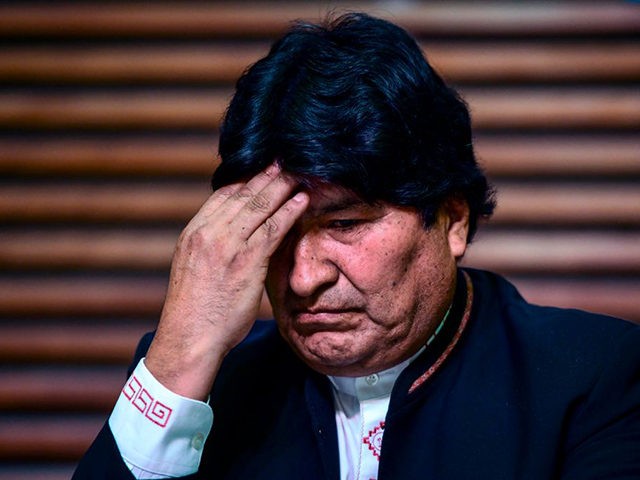Bolivia’s far-left Movement Towards Socialism (MAS) party, expected to win this weekend’s presidential election when the nation’s election commission announces the official results on Tuesday, appears hesitant to embrace its former leader Evo Morales and openly warned him to stay out of the country.
Morales led the MAS party, and the nation of Bolivia, for nearly 14 years prior to October 2019. After successfully forcing the nation’s Supreme Court to remove term limits on the presidency – arguing that banning him from the presidential ballot was a violation of his human rights – Morales claimed to win an illegal fourth term in office that month. Morales abruptly resigned from the presidency and fled to Mexico, then Argentina, after the Organization of American States (OAS) revealed that its observer had documented significant irregularities in vote-counting that jeopardized the legitimacy of the election.
Most of the MAS party’s highest-ranking officials fled with Morales, leaving a conservative senator, Jeanine Áñez, as next in the line of succession. Áñez has served as president for the past year and organized elections that took place on Sunday.
In the interim, Áñez’s government found extensive evidence that Morales committed grave crimes during his time in office. The Áñez government has filed charges for crimes against humanity against Morales at the International Criminal Court (ICC) at The Hague citing evidence that he attempted to use terrorist tactics to starve and kill civilians following his resignation.
These charges stem from the broadcast by Áñez’s government of audio allegedly recorded of a conversation between Morales, in exile, and a senior leftist union leader in which Morales advised the union, “don’t let food into the cities.” Morales’ plan appeared, as per the contents of the tape, to be to starve Bolivian civilians into demanding his return to the country and only allowing them access to food once he returned to power.
Bolivian officials have also said they have evidence that Morales committed statutory rape, including his unexplained appearance as the father on the birth certificate of a child born to a teen girl.
Morales denies all charges.
MAS presidential candidate Luis Arce still appears poised to win Sunday’s election with over 50 percent of the vote as of Tuesday afternoon. A candidate needs over 50 percent to avoid a run-off election between the top two vote-getters. Election officials announced that 87 percent of eligible voters participated in the race, one of the biggest turnouts in Bolivian history.
Following Arce’s victory declaration early Monday morning – when the nation’s Supreme Electoral Tribunal, which runs elections, had only counted less than six percent of the vote – Morales expressed an immediate interest in returning to Bolivia.
“Sooner or later we will return to Bolivia. It is not a debate. It’s a matter of time. My wish is to return to Bolivia,” Morales said during a press conference in Buenos Aires on Monday. He added that he wished not to reenter politics, but to turn to agriculture. As president, Morales was a vocal proponent of the cultivation of coca leaf, the plant used to make cocaine – once famously gifting United Nations Secretary-General Ban Ki-moon a birthday cake made of coca.
Bolivian outlets noted that MAS officials appeared less keen to see Morales’ return now that they had moved on without him.
“At this moment, he cannot return, he has no fundamental guarantees [of rights], he has no due process, it is not convenient for him to come,” Sebastián Michel, a spokesman for the MAS party, said, according to Bolivia’s Página Siete. “Once the guarantees are reestablished, he can come here freely.”
Michel appeared to be referring to the criminal charges against Morales. He did not specify in what way Bolivian police had denied Morales any due process.
The president of the nation’s Senate, MAS lawmaker Eva Copa, also told reporters that the party believes “it is not the right time” for Morales to return. “He still has issues to solve,” Copa noted.
MAS Vice President-elect David Choquehuanca tepidly said that Morales would be “welcome” alongside “all people who are betting on a dignified Bolivia, a growing Bolivia; all people seeking the wellbeing of the Bolivian people are welcome.”
Choquehuanca added ominously, “we all have the opportunity to reflect, to reconsider, and to learn from mistakes.”
Arce, presumably the nation’s next president, did not mention Morales during his victory speech and has attempted to avoid the subject. During an interview with BBC on Monday, Arce repeatedly refused to answer when he believed Morales would return to the country, responding, “you’d have to ask him … I am not going to decide for him.”
“I am not him, you know?” Arce emphasized.
Asked if Morales had told him he would immediately return to the country, echoing his public statements, Arce replied, “well, he said that, but today is the day after the election and he is not here in Bolivia.”
Bolivian political analyst Marcelo Arequipa explained to Página Siete that Morales could become a liability for the MAS party in Bolivia if he returns and does not face justice for his alleged crimes, stating that “the worst thing” for the country would be the socialists appearing to grant Morales impunity for crimes such as statutory rape.
“If that happened, the MAS party would be condemning itself [to lose]. Morales should first respond to the accusations, all of the judicial processes that have been opened should be resolved,” Arequipa suggested.
Página Siete noted that Morales is one of seven MAS fugitives that fled the country with Morales last year, which resulted in Áñez being sworn in as president. Most remain in Mexico under the protection of socialist President Andrés Manuel López Obrador.

COMMENTS
Please let us know if you're having issues with commenting.